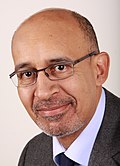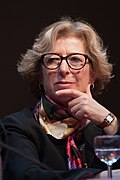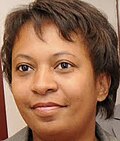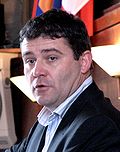Second Valls government | |
|---|---|
| 38th Government of France | |
 Manuel Valls | |
| Date formed | 27 August 2014 |
| Date dissolved | 6 December 2016 |
| People and organisations | |
| Head of state | François Hollande |
| Head of government | Manuel Valls |
| No. of ministers | 16 |
| Member parties | Socialist Party Radical Party of the Left After 11 February 2016 : Socialist Party Radical Party of the Left Écologistes ! |
| Status in legislature | Majority |
| History | |
| Predecessor | First Valls government |
| Successor | Cazeneuve government |
The Second Valls government was the thirty-eighth government in the French Fifth Republic.
Contents
It was led by Manuel Valls, who was appointed Prime Minister of France on 27 August 2014; it consisted of 15 ministers from the Socialist Party (PS) and 2 from the Radical Party of the Left (PRG).
Following Valls's decision to focus on his campaign for the Socialist Party presidential primary, he resigned from his functions on 6 December 2016. [1] The government was succeeded by the Cazeneuve government.
In 2014, the government faced the challenges in unifying a divided Socialist Party and addressing France's economic issues. [2]
Because of the upcoming regional elections in December 2015, Valls faced internal criticism, particularly over his economic reforms, including business-friendly tax cuts. In his speech at the Socialist Party's convention in August 2015, Valls highhilghted the need for "visibility" and "predictability" in the government's actions, trying to find the support of his reforms from the Socialists. However, the criticism inside the party and the government continued and was exacerbated by Economy Minister Emmanuel Macron, who criticised some past socialist economic policies, including the controversial 35-hour workweek. [3]













































